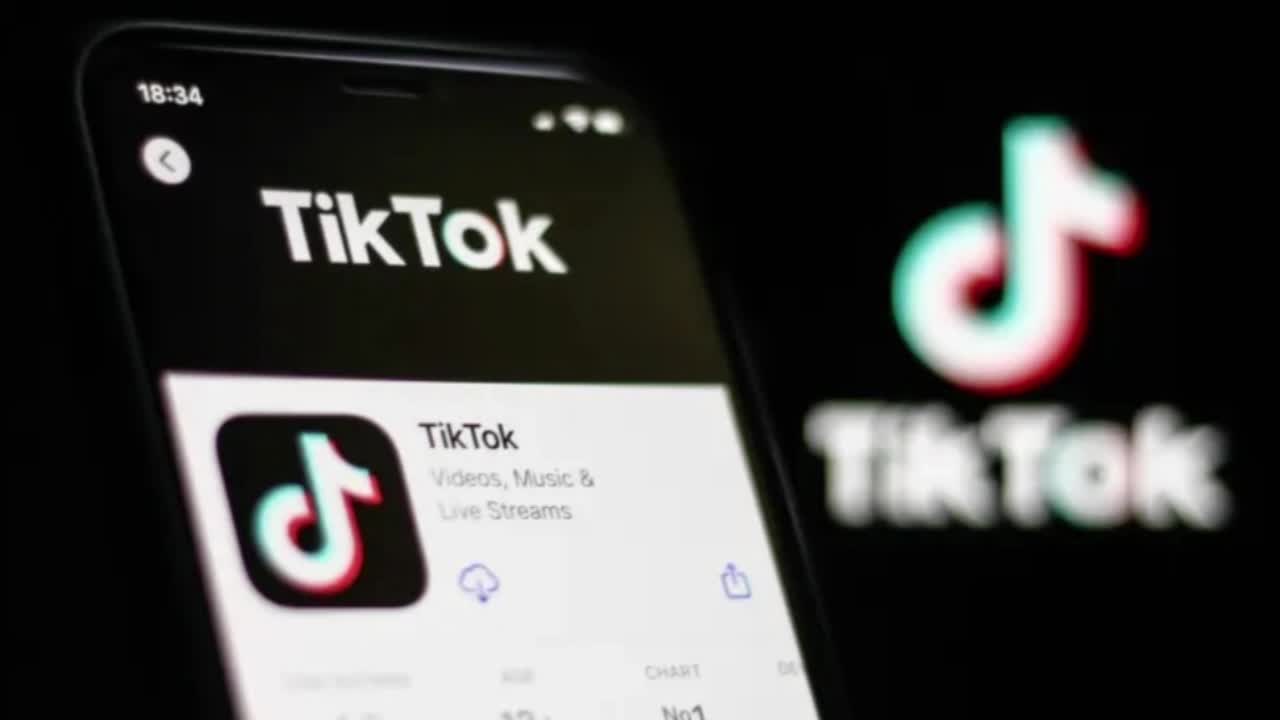Premium Only Content

TikTok banned on government devices under spending bill passed by Congress
TikTok banned on government devices under spending bill passed by Congress
Congress passed a large spending package that includes a bill banning TikTok from being used on government devices.
The package also includes new filing fees for mergers to raise money for the antitrust agencies and a bill requiring online platforms to deter counterfeits by vetting sellers.
Congress failed to pass many of the most aggressive bills targeting tech, including antitrust legislation opposed by the industry.
Under the bipartisan spending bill that passed both chambers of Congress on Friday, TikTok will be banned from government devices, underscoring the growing concern about the popular video-sharing app owned by China’s ByteDance.
The bill, which still has to be signed into law by President Joe Biden, also calls on e-commerce platforms to do more vetting to help deter counterfeit goods from being sold online, and forces companies pursuing large mergers to pay more to file with federal antitrust agencies.
Congress failed to pass many of the most aggressive bills targeting tech, including antitrust legislation that would require app stores developed by Apple and Google to give developers more payment options, and a measure mandating new guardrails to protect kids online. And though Congress made more headway this year than in the past toward a compromise bill on national privacy standards, there remains only a patchwork of state laws determining how consumer data is protected.
Center-left tech industry group Chamber of Progress cheered the exclusion of several antitrust bills that would have targeted its backers, which include Apple, Amazon, Google and Meta.
“What you don’t see in this year’s omnibus are the more controversial measures that have raised red flags on issues like content moderation,” Chamber of Progress CEO Adam Kovacevich said in a statement following the release of the package text earlier this week. The group earlier raised concerns about a prominent antitrust measure, the American Innovation and Choice Online Act.
Another industry group, NetChoice, also applauded Congress for “refusing to include radical and unchecked progressive proposals to overhaul American antitrust law in this omnibus.”
But the bills lawmakers passed in the spending package will still make their mark on the tech industry in other ways.state laws. Etsy and eBay had earlier supported the bill.
“Passing the bipartisan INFORM Act would be a major victory for consumers, who deserve to know who they’re buying from when they visit an online marketplace,” Kovacevich said in a statement. “This legislation has been through years of hearings and markups and has earned the support of both parties as well as brick-and-mortar stores and online marketplaces.”
Etsy’s head of Americas advocacy and public policy, Jeffrey Zubricki, said in a statement the bill “will achieve our shared goal of protecting consumers from bad actors while avoiding overly broad disclosure requirements that would harm our sellers’ privacy and hinder their ability to run their creative businesses.”
Higher fees for big mergers
While more ambitious antitrust measures targeting digital platforms didn’t make it into the end-of-year legislation, there is one bill to help raise money for the antitrust agencies that scrutinize mergers. The Merger Filing Fee Modernization Act will raise the cost companies pursuing large mergers must pay to file with the antitrust agencies, as they’re required to do under the law. The bill also lowers the cost for smaller deals and allows the fees to be adjusted each year based on the consumer price index.
The measure is meant to help fund the Federal Trade Commission and Department of Justice Antitrust Division, which have seen a large uptick in merger filings over the past few years without adequate budget increases.
While it fell short of antitrust advocates’ hopes, the inclusion of the merger filing fee bill still gained praise.
“This is a major milestone for the anti-monopoly movement,” said Sarah Miller, executive director of the American Economic Liberties Project, backed in part by the Omidyar Network. Miller said the bill will “significantly strengthen antitrust law for the first time since 1976.”
“Big Tech, Big Ag and Big Pharma spent extraordinary sums in an unprecedented effort to keep Congress from delivering on antitrust reform and undermine the ability of state and federal enforcers to uphold the law — and they lost,” Miller added.
Sen. Amy Klobuchar, D-Minn., who sponsored the bill, said in a statement earlier this week its inclusion “is an important step to restructure merger fees after decades of the status quo so we can provide our antitrust enforcers with the resources they need to do their jobs.”
“This is clearly the beginning of this fight and not the end,” she said. “I will continue to work across the aisle to protect consumers and strengthen competition.”
Empowering state AGs in antitrust cases
Another antitrust bill included in the package was a version of the State Antitrust Enforcement Venue Act. The bill gives state attorneys general the same power as federal enforcers in antitrust cases to choose the district in which they bring their cases and prevent them from being consolidated in a different district.
Under the legislation, companies defending against claims of antitrust violations won’t be able to pick what they perceive to be a more favorable venue to fight the case.
That’s what happened in an antitrust case against Google brought by a group of state attorneys general accusing the company of illegally monopolizing the digital advertising market. The company transferred the case from Texas to New York, to be heard alongside private antitrust complaints against the company in the pretrial proceedings.
Last year, attorneys general from 52 states and territories wrote Congress in support of the legislation.
Transparency on ransomware attacks
The bipartisan RANSOMWARE Act also made it into the spending bill, requiring the FTC to report to Congress on the number and types of foreign ransomware or other cyberattack complaints it receives.
The FTC also must report to Congress trends in numbers it sees in these complaints, including those that come from individuals, companies or governments of foreign adversaries like China, North Korea, Iran and Russia. And it must share information on its litigation actions related to these cases and their results.
The FTC can also share recommendations for new laws to strengthen resilience against these attacks as well as for best practices that businesses can follow to protect themselves.
Research into tech impacts on kids
A version of the Children and Media Research Advancement (CAMRA) Act is included in the package, directing the Department of Health and Human Services to conduct or support research on the effects of media and technology on infants, kids and adolescents.
-
 2:03:41
2:03:41
The Quartering
5 hours agoTrump To END Income Tax, Captain America Backlash, Obese Rapper Sues Lyft & Surge Pricing In Walmart
84.4K35 -
 1:05
1:05
tether
11 hours agoHadron by Tether - tokenize anything, anywhere
27.9K3 -
 34:32
34:32
Standpoint with Gabe Groisman
20 hours agoGovt. Workers AREN’T Working Says DOGE Chair Sen. Joni Ernst
21.6K9 -
 56:49
56:49
Savanah Hernandez
4 hours agoMASS DEPORTATIONS ARE HERE AND THEY ARE GLORIOUS
37.3K17 -
 21:12
21:12
Clownfish TV
17 hours agoThe Video Game Industry LITERALLY Wants You Dead?!
27K7 -
 1:35:44
1:35:44
Right Side Broadcasting Network
7 hours agoLIVE REPLAY: First Press Briefing by White House Press Secretary Karoline Leavitt - 1/28/25
130K120 -
 1:32:09
1:32:09
vivafrei
8 hours agoJan. 6 Injustices! Jeremy Brown STILL IN JAIL! Untold Story of Ashli Babbitt Killer Michael Byrd!
75.9K27 -
 3:09:52
3:09:52
Benny Johnson
6 hours ago🚨 First Trump White House Press Briefing LIVE Right Now! New Press Secretary With the FLAMETHROWER
168K240 -
 44:12
44:12
Ben Shapiro
5 hours agoEp. 2126 - Did China Just DRINK OUR MILKSHAKE?!
69.3K40 -
 1:11:08
1:11:08
Russell Brand
6 hours agoTrump’s Deportation Wave Begins – SF527
94.7K156